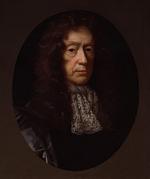Disable ads!
Edmund Waller
Edmund Waller, FRS (3 March 1606 – 21 October 1687) was an English poet and politician who sat in the House of Commons at various times between 1624 and 1679. He was educated at Eton and King's College, Cambridge. He entered Parliament early and was at first an active member of the opposition. In 1631 he married a London heiress who died in 1634. Later he became a Royalist, and in 1643 w a s leader in a plot to seize London for Charles I. For this he was imprisoned, fined, and banished. He made his peace with *Cromwell in 1651, returned to England, and was restored to favour at the Restoration. After the death of his first wife he unsuccessfully courted Lady Dorothy Sidney, the 'Sacharissa' of his poems; he married Mary Bracey as his second wife in 1644. Waller was a precocious poet; he wrote, probably as early as 1625, a complimentary piece on His Majesty's Escape at St Andere (Prince Charles's escape from shipwreck at Santander) in heroic couplets, one of the first examples of a form that prevailed in English poetry for some two centuries. His verse, much of it occupied with praise of Sacharissa, Lady Carlisle, and others, is of a polished simplicity; *Dryden repeatedly praised his 'sweetness', describing him as 'the father of our English numbers', and linking his name with Denham's as poets who brought in the *Augustan age. His early poems include 'On a Girdle' and 'Go, lovely rose'; his later Instructions to a Painter (1666, on the battle of Sole Bay) and 'Of the Last Verses in the Book', containing the famous lines, 'The Soul's dark cottage, battered and decayed, I Lets in new light through chinks that time hath made.' His Poems first appeared in 1645, Divine Poems in 1685, and Poems,. As a member of Parliament during the political turmoil of the 1640s, he was arrested for his part in a plot to establish London as a stronghold of the king; by betraying his colleagues and by lavish bribes, he avoided death. He later wrote poetic tributes to both Oliver Cromwell (1655) and Charles II (1660). Rejecting the dense intellectual verse of Metaphysical poetry, he adopted generalizing statement, easy associative development, and urbane social comment. With his emphasis on definitive phrasing through inversion and balance, he prepared the way for the emergence of the heroic couplet. By the end of the 17th century the heroic couplet was the dominant form of English poetry. Waller's lyrics include the well-known "Go, lovely Rose!".
 Read more on wikipedia.org Read more on wikipedia.org
 All quotes by Edmund Waller All quotes by Edmund Waller
 Edit Edit
|

|
|
|
|
|
Background photo by Giuliana
|